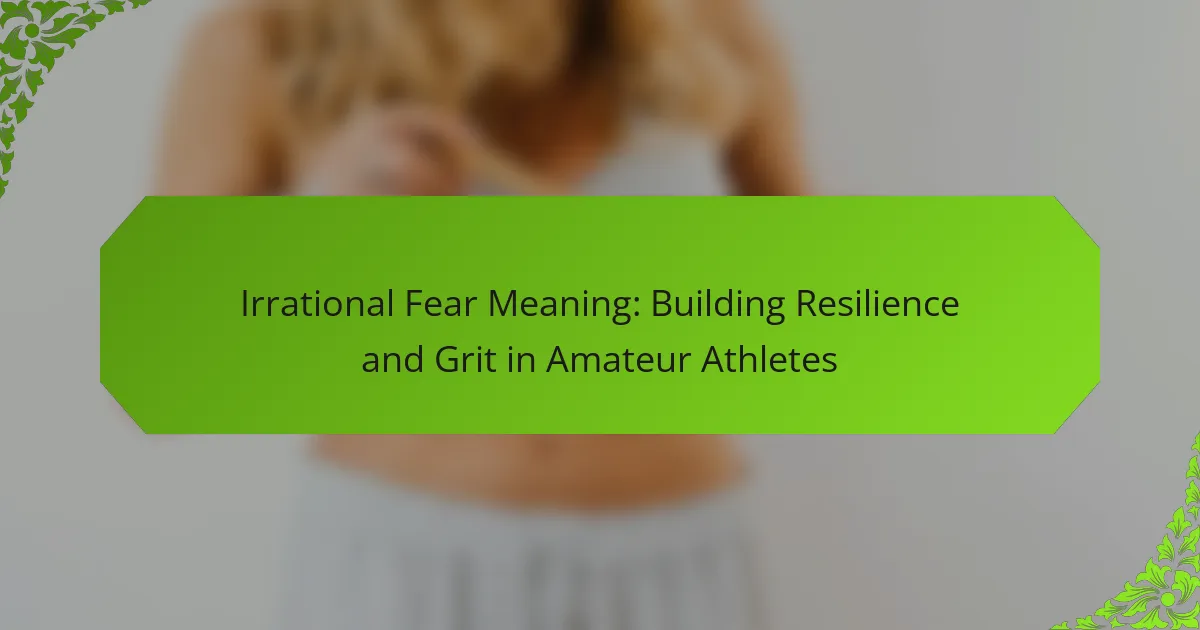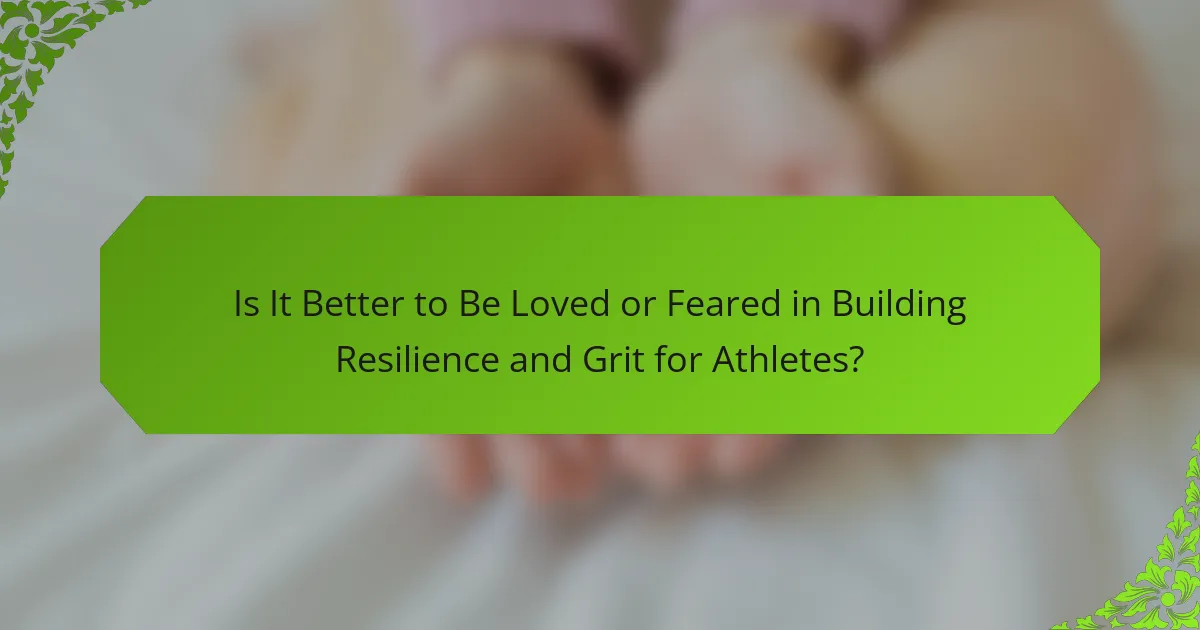Amateur athletes often struggle with setbacks and mental fatigue, making resilience and grit essential for success. This article explores practices like goal setting, maintaining a positive mindset, and developing consistent routines. It also highlights the importance of mindfulness techniques and building a supportive community. By integrating these strategies, athletes can effectively overcome challenges and enhance their performance.

What is Resilience and Grit in Amateur Athletics?
Resilience in amateur athletics refers to the ability to adapt and recover from setbacks, while grit encompasses perseverance and passion for long-term goals. Together, they empower athletes to face challenges effectively. Practices like setting specific goals, maintaining a positive mindset, and learning from failures enhance resilience and grit. These attributes are crucial for sustained performance and personal growth in sports.
How do Resilience and Grit Impact Athletic Performance?
Resilience and grit significantly enhance athletic performance by fostering perseverance and mental toughness. Amateur athletes who cultivate these traits can better navigate challenges, leading to improved training outcomes and competition results.
Research indicates that athletes with high resilience demonstrate better stress management and recovery from setbacks. Grit, defined as passion and perseverance for long-term goals, allows athletes to maintain focus and motivation despite obstacles.
Incorporating specific grit practices, such as setting incremental goals and reflecting on progress, can further strengthen these attributes. As a result, athletes develop a robust mindset, enabling them to push through adversity and achieve their personal best.
What are the Key Components of Resilience and Grit?
Resilience and grit are essential for amateur athletes to overcome challenges. Key components include mental toughness, adaptability, perseverance, and goal orientation. Mental toughness allows athletes to withstand pressure and setbacks. Adaptability enables quick adjustments to changing circumstances. Perseverance drives continuous effort despite difficulties. Goal orientation keeps athletes focused on their objectives, fostering a sense of purpose. Together, these components create a robust foundation for success in sports.

What Universal Practices Enhance Resilience for Amateur Athletes?
Practices that enhance resilience for amateur athletes include setting clear goals, maintaining a positive mindset, and developing consistent routines. These approaches foster grit, enabling athletes to navigate challenges effectively.
Goal setting helps athletes focus on achievable milestones, enhancing motivation. A positive mindset encourages perseverance, allowing athletes to view setbacks as opportunities for growth. Consistent routines establish discipline, which is crucial for overcoming obstacles.
Incorporating mindfulness techniques can further strengthen resilience. Mindfulness practices improve emotional regulation, helping athletes manage stress and anxiety during competitions.
Lastly, building a supportive community provides emotional resources. Engaging with peers and mentors fosters a sense of belonging, which can significantly boost an athlete’s resilience.
How Can Goal Setting Foster Resilience?
Goal setting fosters resilience by providing clear objectives that motivate athletes to persist through challenges. Establishing specific, measurable goals enhances focus and commitment, which are essential for developing grit. Research indicates that athletes who set goals experience increased self-efficacy, enabling them to navigate setbacks effectively. Additionally, tracking progress towards these goals reinforces a sense of achievement, boosting overall resilience.
What Role Does Positive Self-Talk Play in Building Grit?
Positive self-talk significantly enhances grit by fostering resilience in amateur athletes. It reinforces a growth mindset, enabling them to face challenges with determination. This internal dialogue helps athletes manage stress, maintain focus, and improve performance. Research shows that athletes who engage in positive self-talk experience increased motivation and reduced anxiety, which are critical for overcoming obstacles. By cultivating this practice, athletes can develop a unique attribute of mental toughness, essential for long-term success in their sports endeavors.
How Important is a Support System in Developing Resilience?
A support system is crucial for developing resilience in athletes. It provides emotional backing, practical advice, and a sense of belonging. Research indicates that athletes with strong support networks exhibit higher levels of grit, enabling them to overcome challenges more effectively. This support can come from coaches, teammates, family, or friends, offering diverse perspectives and encouragement. As a result, athletes can navigate setbacks and maintain motivation, ultimately enhancing their performance and personal growth.

What Unique Strategies Can Amateur Athletes Use to Cultivate Grit?
Amateur athletes can cultivate grit through consistent practice, goal setting, and resilience training. Developing a growth mindset enhances their ability to embrace challenges. Setting specific, measurable goals fosters determination. Engaging in resilience training, such as mindfulness and stress management techniques, helps athletes overcome setbacks. Building a supportive community also reinforces their commitment and motivation.
How Does Embracing Failure Contribute to Grit Development?
Embracing failure significantly contributes to grit development by fostering resilience in amateur athletes. It encourages them to view setbacks as learning opportunities, enhancing their persistence in the face of challenges. Research indicates that athletes who embrace failure are more likely to develop a growth mindset, which is crucial for long-term success. This mindset allows them to adapt their strategies and improve their performance over time. By normalizing failure, athletes build mental toughness, enabling them to push through adversity and remain committed to their goals.
What Techniques Can Athletes Use to Maintain Focus Under Pressure?
Athletes can use techniques like visualization, mindfulness, and breathing exercises to maintain focus under pressure. Visualization helps create mental scenarios, enhancing confidence and performance. Mindfulness cultivates present-moment awareness, reducing anxiety. Breathing exercises regulate stress responses, promoting calmness. These practices collectively enhance resilience and grit, essential for overcoming challenges in sports.

What Rare Attributes Contribute to Exceptional Resilience in Athletes?
Exceptional resilience in athletes stems from rare attributes like adaptability, intrinsic motivation, and emotional intelligence. Adaptability allows athletes to adjust strategies during competition, enhancing performance under pressure. Intrinsic motivation drives sustained effort, even in the face of setbacks. Emotional intelligence fosters strong relationships with coaches and teammates, supporting mental well-being. These attributes collectively create a robust framework for overcoming challenges and achieving long-term success.
How Do Personal Stories of Overcoming Adversity Shape Resilience?
Personal stories of overcoming adversity significantly enhance resilience by providing relatable examples and motivation. These narratives showcase grit practices that amateur athletes can adopt, such as setting realistic goals, maintaining a positive mindset, and developing a strong support network. Research indicates that sharing experiences fosters community, which is crucial for emotional strength. By learning from others, athletes can internalize resilience strategies, making them more adaptable to challenges. This unique attribute of personal storytelling not only inspires but also equips individuals with practical tools to navigate difficulties effectively.
What Unique Mindsets Distinguish Highly Resilient Athletes?
Highly resilient athletes distinguish themselves through a growth mindset, unwavering determination, and emotional regulation. These mindsets foster adaptability and perseverance in the face of adversity. Growth mindset enables athletes to view challenges as opportunities for development. Unwavering determination drives consistent effort despite setbacks. Emotional regulation helps manage stress and maintain focus during competition. Together, these unique attributes create a foundation for overcoming obstacles and achieving success in sports.

What Are the Common Challenges Amateur Athletes Face in Building Resilience?
Amateur athletes face several challenges in building resilience, including mental fatigue, lack of support, and inconsistent training. Mental fatigue can stem from balancing sports with other commitments, leading to burnout. A lack of support from coaches or peers can hinder motivation, making it difficult to stay committed. Inconsistent training schedules can disrupt progress, causing frustration and self-doubt. Addressing these challenges requires grit practices, such as setting realistic goals and developing a strong support network.
How Can Athletes Overcome Mental Barriers to Resilience?
Athletes can overcome mental barriers to resilience through targeted grit practices. Techniques like visualization, goal-setting, and positive self-talk foster mental strength. Research shows that athletes who employ these strategies report improved performance and greater emotional stability. Regularly engaging in mindfulness exercises enhances focus and reduces anxiety, contributing to a more resilient mindset.
What Physical Challenges Affect Grit and Resilience?
Physical challenges such as injuries, fatigue, and chronic conditions can significantly affect grit and resilience in amateur athletes. Injuries often lead to emotional setbacks, while fatigue impacts performance and motivation. Chronic conditions can create ongoing hurdles that require mental fortitude to overcome. Developing coping strategies and support systems is essential for maintaining resilience despite these challenges.

What Are the Best Practices for Integrating Resilience Training into Athletic Routines?
Integrating resilience training into athletic routines involves consistent practice, mental strategies, and supportive environments. Focus on developing grit through regular challenges, goal setting, and reflection on experiences.
1. Establish a routine that includes mental exercises, such as visualization and mindfulness, to strengthen focus and emotional control.
2. Incorporate physical challenges that push athletes beyond their comfort zones, fostering adaptability and perseverance.
3. Set specific, measurable goals that encourage gradual progress and celebrate small victories to build confidence.
4. Create a supportive community where athletes share experiences and strategies, enhancing collective resilience.
How Can Athletes Create a Daily Resilience Practice?
Athletes can create a daily resilience practice by incorporating specific routines that build mental toughness. Start with setting clear goals to focus your efforts. Incorporate mindfulness techniques, such as meditation or deep breathing, to enhance emotional regulation. Consistently engage in physical challenges to develop grit, fostering a growth mindset through reflection on both successes and setbacks. Lastly, establish a support network to share experiences and strategies, reinforcing resilience through community.
What Common Mistakes Should Athletes Avoid When Developing Grit?
Athletes should avoid common mistakes like setting unrealistic goals, neglecting recovery, and failing to seek support. These pitfalls can hinder the development of grit. Unrealistic goals lead to frustration and burnout. Neglecting recovery impairs performance and resilience. Seeking support from coaches and peers fosters a growth mindset, essential for overcoming challenges.
What Expert Insights Can Help Athletes Enhance Their Resilience and Grit?
Expert insights can significantly enhance athletes’ resilience and grit through targeted practices. Strategies include setting specific goals, developing a growth mindset, and embracing challenges. Research indicates that athletes who focus on incremental progress demonstrate greater resilience. For example, maintaining a positive self-talk routine can help athletes navigate setbacks effectively. Additionally, building a supportive community fosters accountability and motivation. Incorporating mindfulness techniques, such as meditation, can also improve emotional regulation, further enhancing grit. These practices collectively empower amateur athletes to overcome challenges and thrive in their sports.



